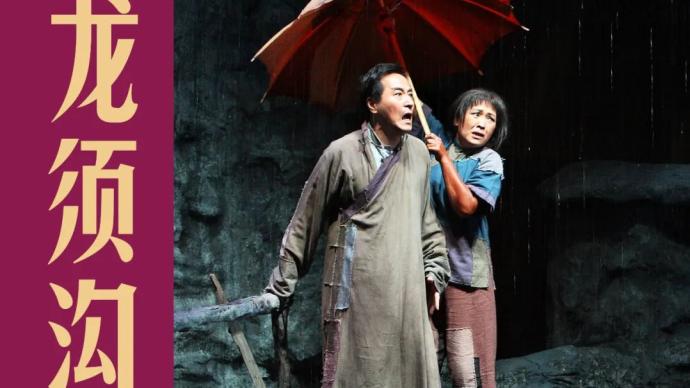
"Dragon Beard Ditch" was created by the literary master Lao She in the 1950s. After the script was completed, under the guidance of Jiao Juyin's realistic techniques, it was created by the older generation of performing artists such as Shizhi, Ye Zi, Zheng Rong and Ying Ruocheng. A large number of vivid and flexible characters have infected generations of audiences. Beginning with this play, Beijing Renyi initially established a unique style of play, and the playwright Lao She was awarded the title of "People's Artist" by the Beijing Municipal Government.
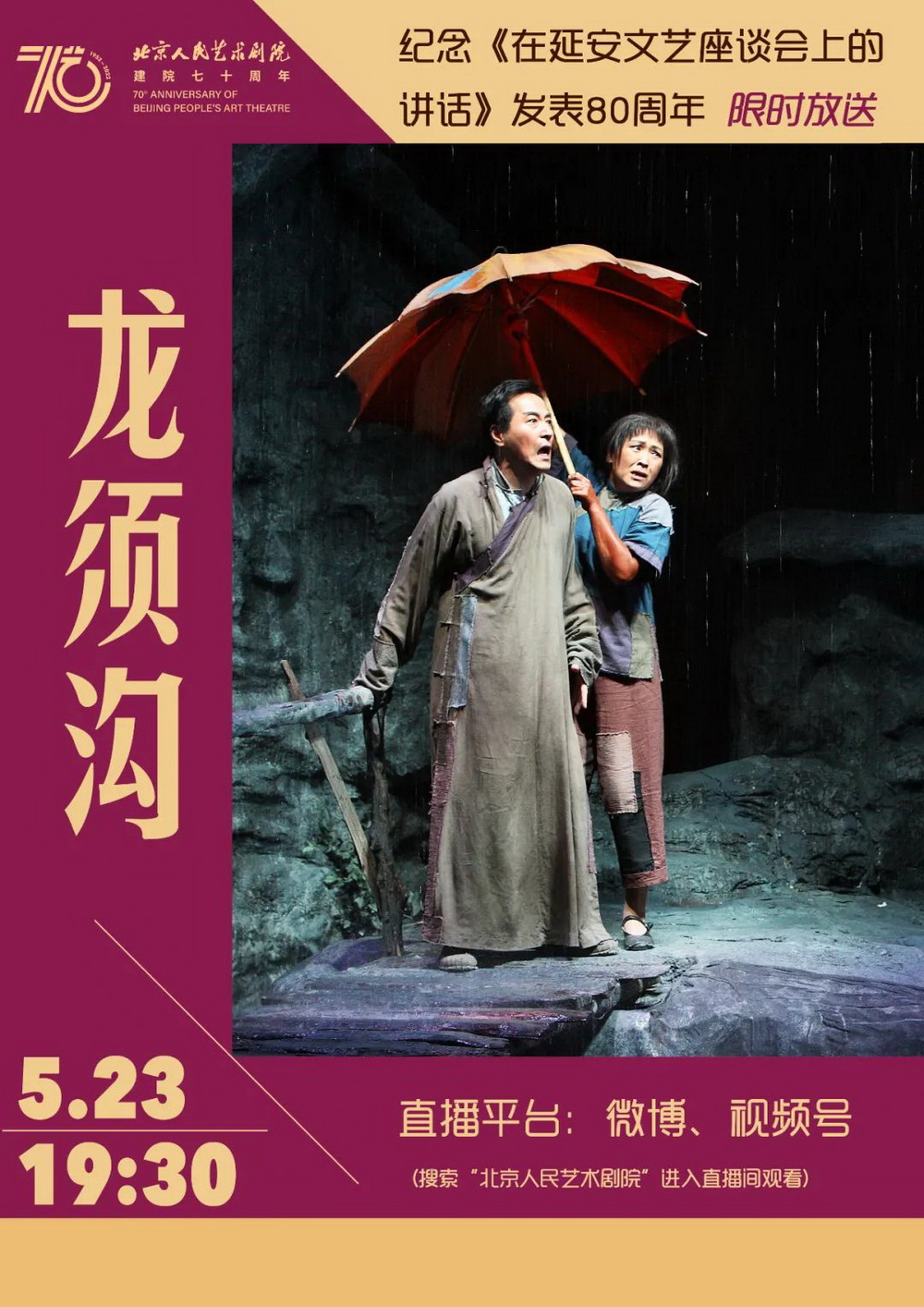
On the evening of May 23, the Beijing People's Art Theater broadcast the dramatic video of the theater's classic realism drama "Dragon Beard Ditch" for a limited time through the official video account, official Weibo and other platforms.
"Live, live, live again", master the creative method of realismMay 23, 2022 is the 80th anniversary of the publication of Mao Zedong's "Speech at the Yan'an Symposium on Literature and Art". Looking back on the past, 80 years ago, director Ouyang Shanzun, who just arrived from the front line of the 120th Division of the Eighth Route Army Combat Drama Club and later became an important founder of Beijing Renyi, personally experienced this important meeting that had a profound impact on the cause of Chinese literature and art. .
After listening to Chairman Mao's important exposition on "What is our literature and art?", Ouyang Shanzun said: "The soldiers and the common people have a lot of requirements for literature and art workers, they want you to sing, act, and you Drawing cartoons, asking you to write articles, and asking you to teach them to do it. It may seem like you put in a lot of work, but in fact, you receive and learn more from them.” After the meeting, he Together with several colleagues, I wrote a letter to Mao Zedong about what I thought after attending the meeting, and received a reply. After this meeting, a large number of literary and art workers, including Ouyang Shanzun and others, strengthened their belief that revolutionary literature and art serve the workers, peasants and soldiers.
At the end of 1949, Lao She returned from the United States and was elected chairman of the Beijing Federation of Literary and Art Circles in June of the following year. At that time, the land of China was in ruins, and the enthusiasm of the people of the whole country to build a new China was unprecedentedly high. The capital Beijing also launched a massive infrastructure renovation and environmental governance movement, and the reconstruction of the Longxugou project was put on the agenda. Longxugou is said to be the old route of the lower reaches of the Gaoliang River in ancient times. Since it was "at the foot of the emperor" in the capital of Ming and Qing dynasties, it has the good name of Longxugou. However, the reputation is on the outside, and it is ruined. Before the founding of the People's Republic of China, the foul-smelling waste water from the handicraft workshops, leather tanning and dyeing workshops was all discharged directly into the Longxu Ditch, which was actually a stinky ditch where dirt drifted and mosquitoes and flies were born.
In 1950, the Beijing Municipal People's Government decided to renovate the sewers, and the largest stinky water ditch and the slum Longxugou also received large-scale environmental improvement. Such a new capital construction measure related to people's livelihood, written by Lao She, has been widely publicized with great effect through the Beijing People's Art performance. This work is the "foundation work" of Beijing Renyi, the three-act play "Dragon Beard Ditch".
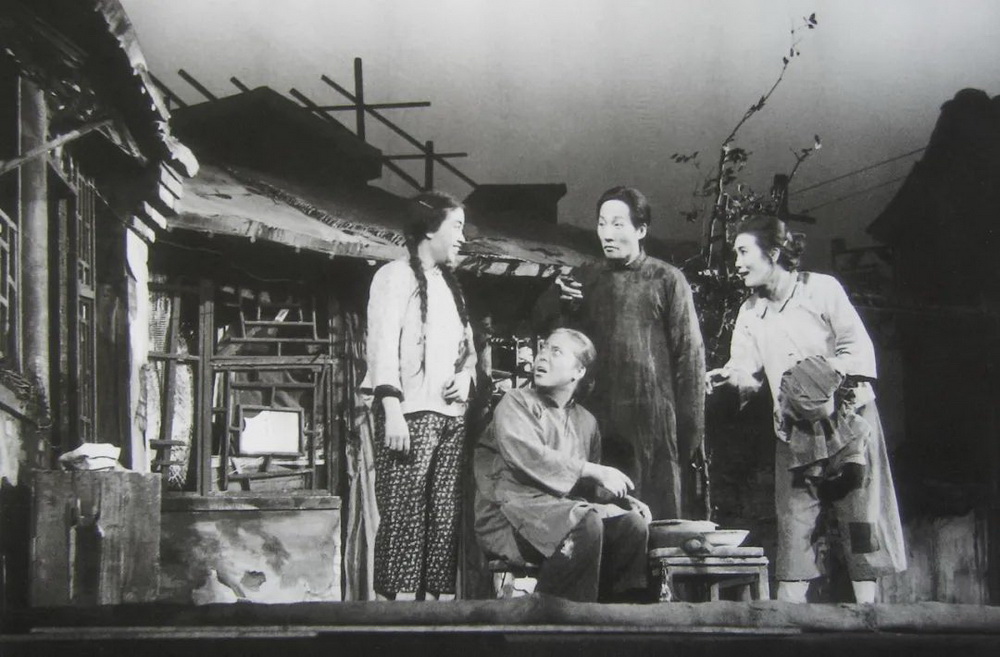
Stills from the old version of "Dragon Beard Ditch", so Zhi (second from right) plays Cheng Lunzi, courtesy of Beijing People's Art Theatre Museum
Lao She once recalled: "I would hold on to the stinky ditch, so as to praise the people's government for repairing the ditch. Even if I am immature, I have to reflect on it." It is inconvenient, my right hand is always leaning on a cane. If you can’t go to the grassroots often, the leaders of Renyi will send people to interview on your behalf, find materials, and give them to Lao She. This method is also known as the "three combinations": the leader produces ideas, the masses produce life, and the writer produces skills.Going back to the "Yan'an Gene" of Beijing Renyi, at the beginning of the establishment of the academy in 1952, Cao Yu, Jiao Juyin, Zhao Qiyang and Ouyang Shanzun, known as the "four giants of the academy", made famous 42 about what kind of theater to build. Hourly conversation, in-depth discussion of how Beijing Renyi will be built in the future. What few people know is that in order to better grasp the direction of the establishment of the institute, the four specially studied Chairman Mao's "Speech at the Yan'an Symposium on Literature and Art", Zhao Qiyang recalled: "We realized that this was a response to Marxism-Leninism. The most comprehensive and systematic classical literature on the concept of literature and art is also the guide for us to build the art of new Chinese drama..."
From July 16th to 17th, 1952, Beijing Renyi held the first academic affairs meeting (expanded) after the establishment of the institute, mainly to study and formulate the plan for going to the countryside, and to clarify the three major tasks of going to the countryside, namely: deepening the idea of life transformation ; Adhere to political study; master the realistic creation method for artistic creation.
As for the previous rehearsal of "Longxugou", the director Jiao Juyin asked the actors to "live, live, and live" in the prescribed scene on the stage. The masses eat and live together, capture the details of life, observe the life of the characters, and require every character to be real, three-dimensional, vivid, and make the work "Dragon Beard Ditch" obtain a vitality beyond the times. It also laid an important foundation for Renyi's future creative methods.
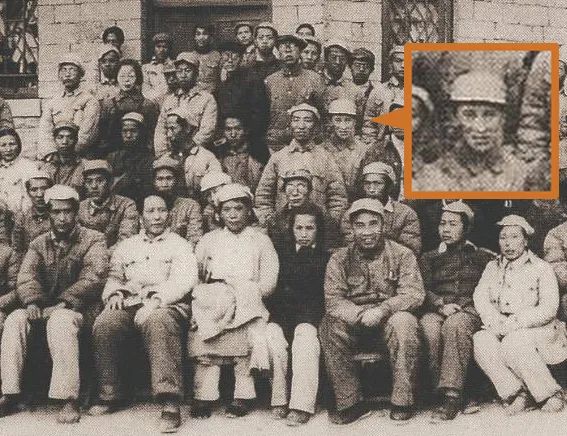
In 1942, Ouyang Shanzun participated in a group photo as a representative of the Yan'an Literature and Art Symposium
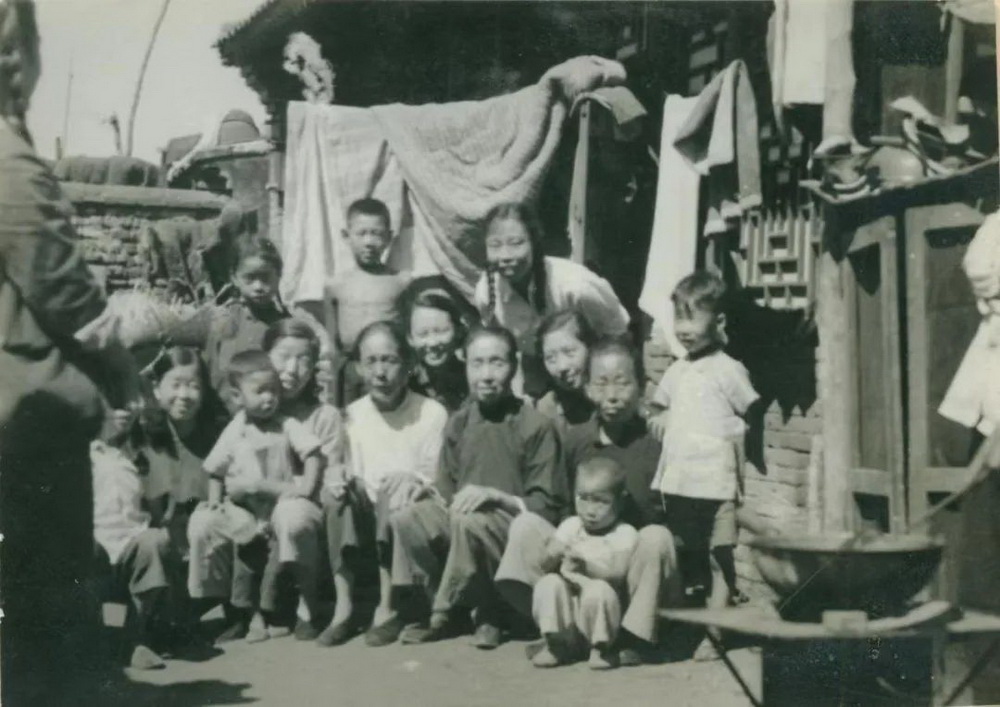
In the 1950s, the crew of Beijing Renyi's "Longxugou" went to Longxugou, Nancheng, Beijing to experience life
Restoring the classics, going beyond "commemorative performances"In 2009, in order to commemorate the 110th birthday of Mr. Lao She, Beijing Renyi was directed by the famous director Gu Wei, and the new version of "Dragon Beard Ditch" was rearranged and staged. Xia Liyan and others play important roles in the play. According to the changes and needs of the times, Gu Wei has made a relatively large adjustment to the script, endowed the characters with a newer destiny of the times, and made the whole play more inclined to care for the spiritual demands of contemporary audiences, thus gaining widespread social recognition.
In an exclusive interview with The Paper, Gu Wei recalled that since "Dragon Beard Ditch" was put on the stage in the 1950s, there were not many performances. "The version of the performance has always been the version arranged by Mr. Jiao Juyin. The real change in the script was in 2009. At that time, the task assigned by the theater was to commemorate the 110th anniversary of Mr. Lao She. I'm not optimistic. What's so good about rags and rags? Besides, there are some slogan-style plots in the last two games, and I'm also worried about whether the audience can accept it now. But I don't see it that way. Since there is a chance to restore the typical 'Old Beijing Opera' of Renyi, it is still necessary to recreate it properly. It should be said that the rearrangement took a little risk."
Gu Wei admitted frankly that if he followed the original way of acting, especially in Acts 2 and 3, it would be a little untenable. "Because of the dramas before the founding of New China, Mr. Lao She had a lot of life, the characters were all in his heart, and he was ready to write. After liberation, he just returned to New China with his legs and feet. Listening to other people's retelling. He later said himself that the script of "Dragon Beard Ditch" was completed in less than a month, and 'it was an adventure'."
"But Lao She has a simple class feeling. He is not from a young master or a child of a rich family. He naturally supports the people's government. He thinks that liberation is a good thing, a great good thing for the working people to turn over, and he doesn't need to turn around in his thinking. Son, this is not the same as other writers. He has really suffered from oppression and class exploitation. But on the one hand, he is full of enthusiasm, and the presentation of his works is still more or less a slogan. As a play , how to show the development and changes of the characters? This is not enough." Gu Wei said.
In Gu Wei's view, one of the biggest problems with the earlier plays was the interpretation of the theme. "In the old version, including the end of the movie, Madman Cheng looked at the tap water and handed out bamboo cards to everyone, as if he was 'self-reliant'. I felt that this was not enough. So I wrote in depth about how Madman Cheng continued to think after his liberation. My own octagonal drum, I want to be a man again and realize the value of man, which is in line with the development of the times today. 'The old society turns people into ghosts, and the new society turns ghosts into people'. Eat, this is liberation, I still want to settle on the liberation of human beings when I am arranging, let the artists who were oppressed and damaged in the old society come back on stage, pick up the octagonal drum again, and sing about a new life happily. This is the biggest change from the original."
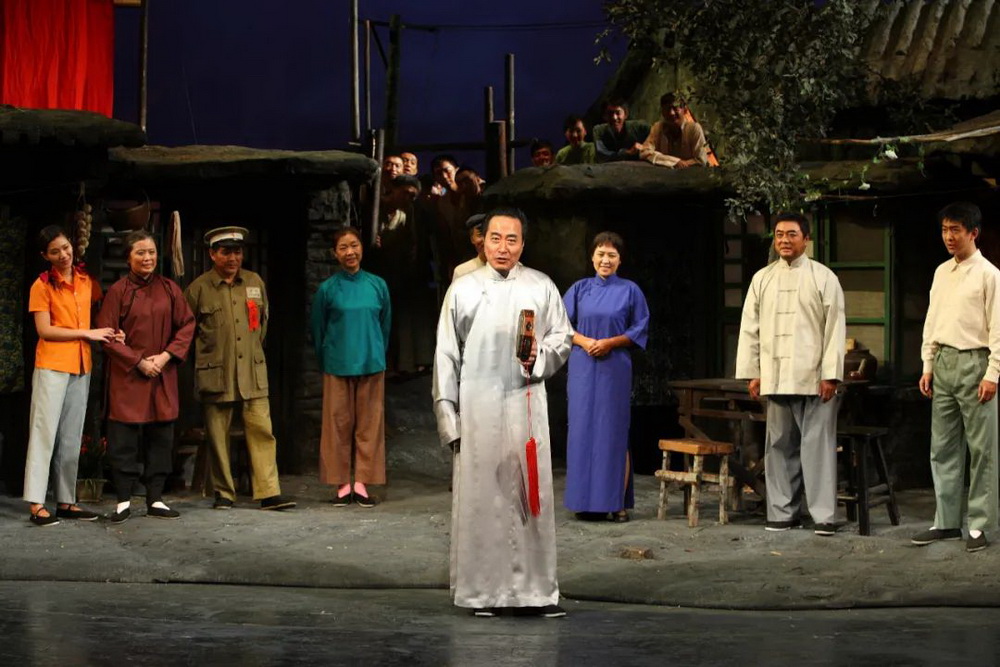
The new layout of "Dragon Beard Ditch" stills, Yang Lixin (middle) as Cheng Lunatic
In the rearranged version of "Dragon Beard Ditch", Cheng Lunzi completely strung the theme in the last two acts. "We emphasized Cheng Lunzi's obsession with Xiao Niuzi, making a fuss about the glass fish tank left by Xiao Niuzi, and even having a conversation between the two, so that the character is more complete. At the end, everyone asked him to sing New Beijing. , he picked up the octagonal drum and put on a silver-gray coat... In this way, he kept pace with the times in the interpretation of the theme." Gu Wei said that in addition to Cheng Lunzi, in order to increase the drama of the second and third scenes, the script was rearranged It also linked Aunt Wang and Uncle Zhao into a pair of "Twilight Love", "Although there were faint signs of this in the original version, we made it clear at that time, this is an adjustment. Then there is the original script. Ergazi is several years younger than Erchun, and we have also made adjustments. Erchun is older than Gazi, so the two of them can go to Shijingshan and enter the steel factory together, so that the dramatic contradictions between the two families will be enriched."In addition to the adjustment of the character settings, the new version of "Dragon Beard Ditch" has also improved the stage design. "The original stage was 'Longxugou can't see the ditch'. I always felt that the title of the play "Dragonxugou", if the audience couldn't see the ditch on the stage, there would be a problem in entering the plot, and the drowning of the little girl and this The ditch has such a big relationship, so I suggested that the new version must "see the ditch", and made such a ditch with impermeable materials on the stage. At the beginning of the first act, the residents really poured dirty water into the ditch , Xiaoqiao also spans this ditch, and there is such a hustle and bustle of life in the market on the whole stage."
Benefiting from the improvement of stage installation conditions, a turntable was also used in the choreography of the new row "Dragon Beard Ditch". "In this way, the movement of the characters is easier to express. For example, Ding Sisao went to the grave to see the little girl, the police patrolled the edge of the ditch, and people came to have a meeting, including the activities on the edge of the stinky ditch. These scenes were all completed by turning the stage. After the 'opening' of this play, it is no longer 'closing', it is completely dependent on the turn of the stage to complete the transition between scenes." Gu Wei said.
"Dragon Beard Ditch" was adapted into a opera in 1996, and the director of this opera version is Gu Wei. "The opera "Dragon Beard Ditch" co-adapted by Zhang Yonghe and I has been performed until now, and there have been hundreds of performances. With this foundation, in 2009, in the second two acts of the re-arrangement of the drama, I started from the opera version. I brought some things from here, such as the couple in the play, the old man and the young man, Madman Cheng's nostalgia for the little girl, Madman Cheng always wanted to be on stage, after these changes, the life of the whole play The breath is strong." Gu Wei recalled that it was only a "commemorative performance" at first, but the sensation of the actual effect of the performance made "Dragon Beard Ditch" have many rounds of performances in the past ten years. "The audience did not dislike watching the play because of the hard times in the old society described in this play, nor was it just because it was to commemorate Mr. Lao She to come to the play, but because the play itself could catch people. I put the original and the play. Together, it took a month to revise, and now it looks like the result is good."
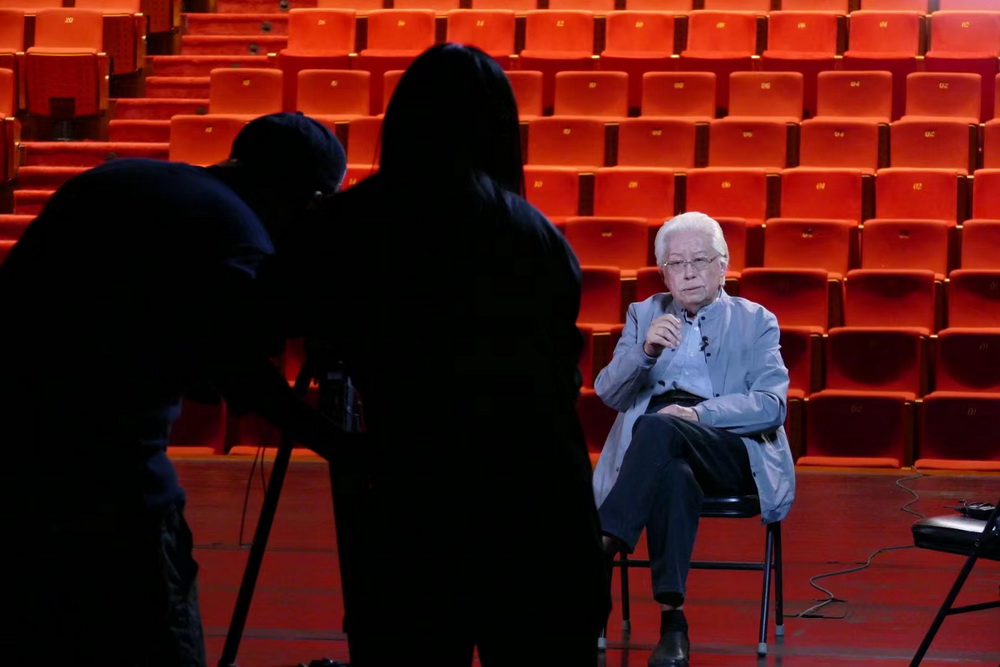
Director Gu Wei's close-up photography: Si Yu
Rich plot, "Can I sing?" "Can you!"The version screened on the evening of May 23 is "Dragon Beard Ditch", which was rearranged by director Gu Wei in 2009, starring Yang Lixin, Xia Liyan and other performing artists. Speaking of which, Beijing Renyi will celebrate its 70th birthday next month. Over the past 70 years, generations of artists have practiced the spirit of the Yan'an Literature and Art Symposium with practical actions, always stood firm on the people's stand, focused on the people, paid attention to reality, took root in life, adhered to the realistic creative style, and created one after another. A masterpiece that the audience loves to see.
Starring Yang Lixin was also interviewed by The Paper. When I heard the reporter said that the role of the lunatic was played by Yu Zhi, he corrected himself with a smile, "I took over the role of Mr. Yu, but it cannot be said that Mr. Yu played my role before. That would be a mess. My son." In his opinion, Cheng Lunzi in "Dragon Beard Ditch", Yu Yongze in "Song of Youth", Wang Lifa in "Tea House", "Old Horse" in "Camel Xiangzi"... these are all so The classic role left by Zhi, "is immortal. So I was really uneasy when I took over Cheng Lunzi."
Yang Lixin is a native of Beijing, born in Nancheng, and mayor of Nancheng. The story of "Dragon Beard Ditch" takes place in the southern city of Beijing. "My home is at Zhushikou, not far from Longxugou, and the straight-line distance is only a few hundred meters. If Longxugou is still there, there are still about 30 meters of that small street, just north of the Temple of Heaven. The wall, across the road, is diagonally opposite the Hongqiao Market. Just to the west, most of the side towards the Goldfish Pond has disappeared. I also went to the scene to take pictures when the play was rearranged. This is a must Yes, performance is about going deep into life. In order to let the characters live on the stage, Mr. Jiao Juyin also asked our senior actors to go to Longxugou to experience life. The experience is not enough. He takes notes and writes down his experiences. Afterwards, Mr. Jiao wants to check of."
Yang Lixin recalled with interest that Beijing Renyi, as a theater combining realism and romanticism, "Dragon Beard Ditch" can be regarded as the beginning of the theater's realistic creation. "When the academy was established in the 1950s, Mr. Jiao Juyin was still the dean of the School of Literature and the head of the Department of Spanish at Beijing Normal University, and he was invited to direct the play." "The premiere was in 1951, when the best theaters in Beijing were not Not many—the Capital Theater was only completed in 1954—there are hardly any decent theaters, all of them are the old-fashioned singing opera 'Yuanzi'. This play should have premiered in the theater of China's children's art at that time, before the founding of New China There used to be the True Light Cinema. After the founding of New China, it was renamed the Beijing Theater. The China Children's Art Theater we see now has been remodeled in the later period. At the beginning, the entrance of the theater was very small, but it was a good theater in those days. already."
Looking back at the specific stage performances of the year, Yang Lixin also spread his hands. "I have always been very uneasy about this play, I dare not comment too much on myself, or comment on the play, because there was no video, not even an audio recording. Please come here from the Literature and Art Department of the Central People's Broadcasting Station and put three microphones on the lips of the stage. At that time, Renyi's own tape recorder was used to record the stage effect, which was not up to the level of stage recording. It's a movie with the same name. But I didn't dare to watch it before I was lined up for this play. Once I saw it, I would imitate it. Imitation is just like someone else's act, and it's easy to cut corners. This is human inertia, so don't do it at all. bump."
Yang Lixin recalled the daily life in old Beijing in the 1950s and 1960s, and he was somewhat impressed, "I still have a little memory of that temperament and taste, but how did this taste come to the stage? The difficulty is that the audience still doesn't recognize it. Recognize? In addition, this is a play from the 1950s after all. Now it is a bit too simple and has no plot. The history is turned, and there is a comparison between the old and new society. Apart from the comparison, there are not too many plots and details. In the original work of Cheng Lunzi's tragic history It's all 'said' on the stage, without much acting."
And the best performance, should not just show emotion. "This is a point that Beijing Renyi particularly despises. If you say that this person can't act anything, he will act out the character's emotions and state, and he can't act out the character's actions and behaviors. This is what an expert actor seems to be waiting for. "Yang Lixin introduced that Director Gu Wei used the adaptation of the previous opera, and then to the second fusion during the rearrangement," a lot of 'singing' and 'acting' were added, and Shulaibao was also adapted into a single string. Okay. As I'm no stranger to single strings, the melody is all in my head."
At the end of the drama version of "Dragon Beard Ditch", Cheng Lunzi reappeared on the stage to sing a single string, which was also retained at the end of the rearranged drama version. Yang Lixin on the stage handled it like this, "Uncle Zhao, can I sing? Madam, can I sing? (Cheng Lunzi asked everyone for opinions) I also asked the audience at the time, can I sing? No Thinking, there was really a quarrel in the auditorium upstairs, and I said, 'You can!' Being an actor is the happiest moment, and everyone's feelings on and off the stage are all invested."
"Let's take a look at the character Cheng Lunatic, his pain, his inner block, how did he get melted in the new society little by little? The last sing 'Xiao Cai'er' is what he has been longing for for a long time. There was an outbreak, but he still couldn't remove it, and he couldn't untie the knot in his heart. He needed an external force to push him. You can! Well, I can!" Yang Lixin said, can this design be synchronized with the audience's psychology? It's not easy, "the audience watching the drama doesn't just accept what they see, they think through the performance of the actors, after thinking, they either appreciate you, or judge you. It's hard to convince the audience, but we do it anyway. Arrived."
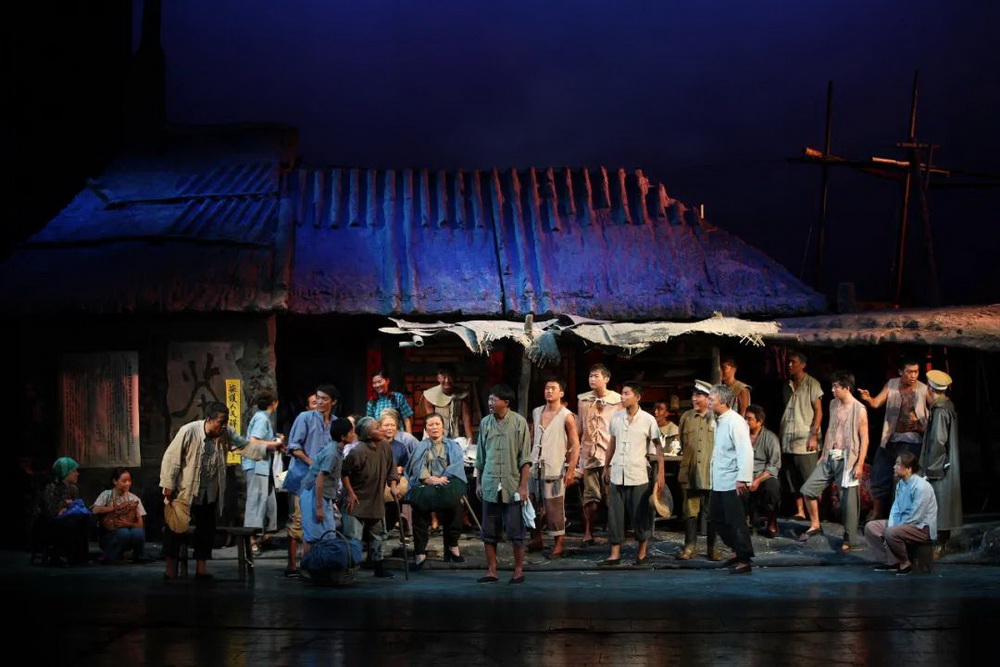
The new layout of "Dragon Beard Ditch" stills